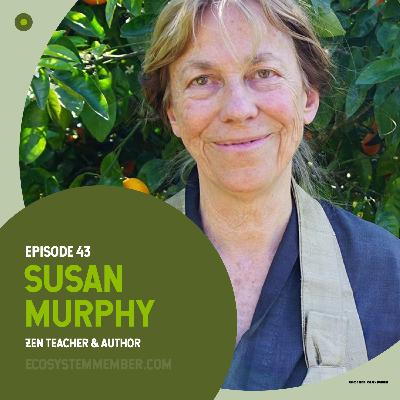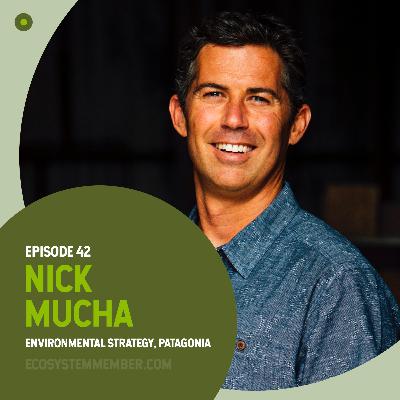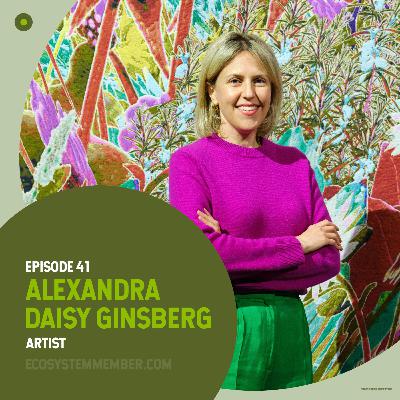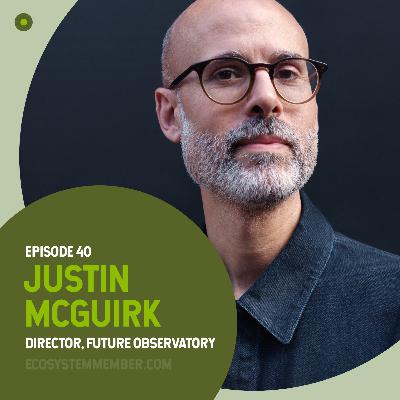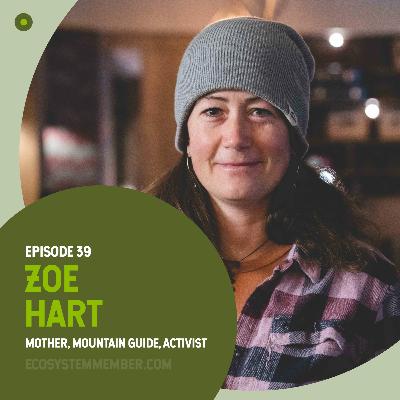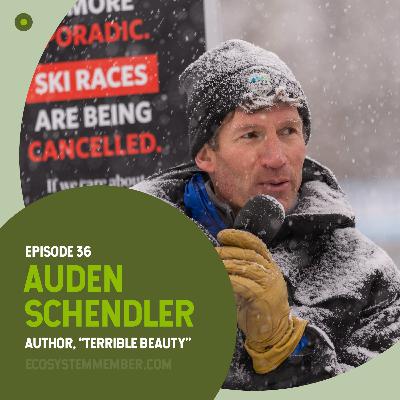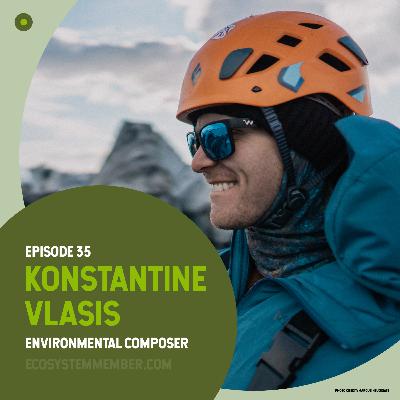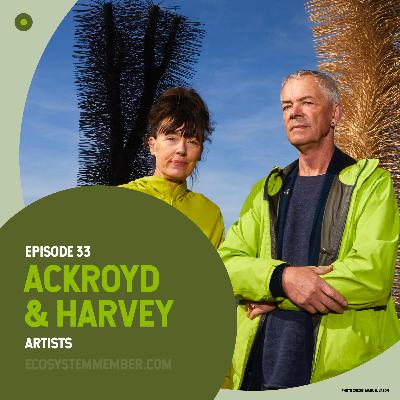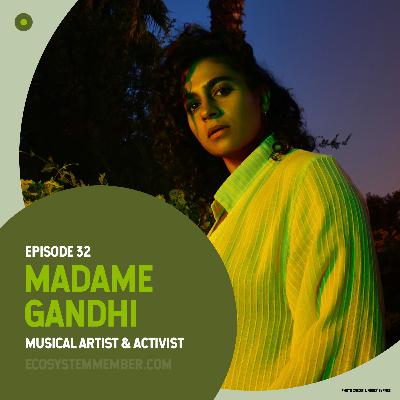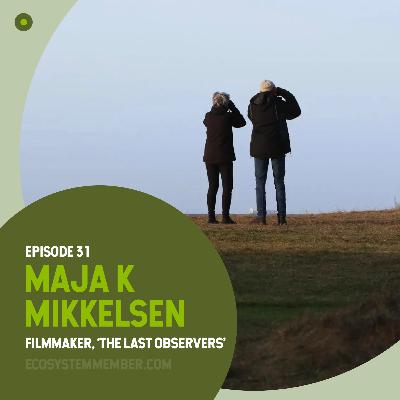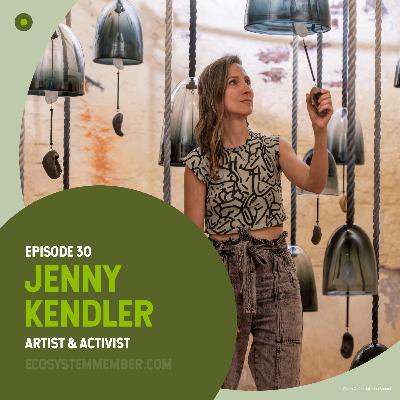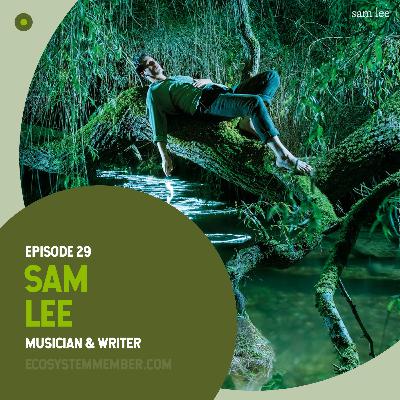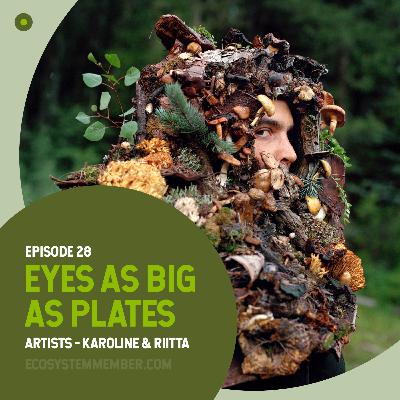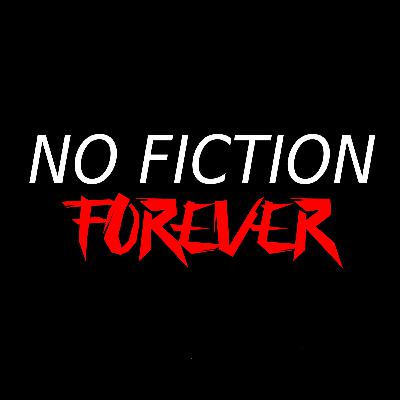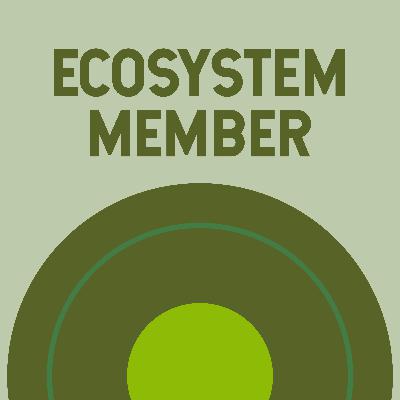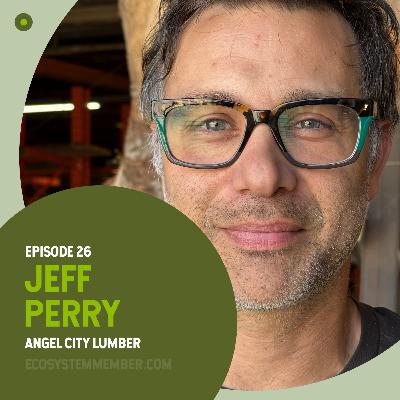Discover Ecosystem Member
Ecosystem Member

Ecosystem Member
Author: Ecosystem Member
Subscribed: 1Played: 32Subscribe
Share
© Ecosystem Member
Description
Ecosystem Member explores the relationship people have with nature and the more-than-human world.
ecosystemmember.com
ecosystemmember.com
45 Episodes
Reverse
Hey folks, thanks for tuning in to the latest episode of the Ecosystem Member podcast. Today’s episode is one that I had in mind when I first started formulating the idea for this podcast about two years ago and is a fitting end to season two of the podcast.Dr. Susan Murphy Roshi is the founding teacher of Zen Open Circle in Sydney, Australia, as well as a writer, radio producer, film writer and director. I came to know her through two of her books - 'Minding the Earth, Mending the World: Zen and the Art of Planetary Crisis' and her latest book 'A Fire Runs Through All Things: Zen Koans for Facing the Climate Crisis'.In this episode, we talk about what a Zen perspective on the climate crisis looks like and the concept of Engaged Buddhism, the interconnectedness of all things with a practice from Susan on how to help us recognize that connectedness, and her unique background that brings together Zen and Aboriginal teachings. This is episode 43 of the podcast and probably is my favorite one yet for a lot of reasons. The first being that a lot of my contemplation about our human relationship with nature came through my study of Buddhism and Zen. About a decade ago, I was lucky enough to be introduced to an amazing career coach named Michael Carroll who was a high flying human resources executive at a number of well known companies including the Walt Disney Company and an authorized Buddhist teacher who wrote the books 'Awake at Work' and 'Fearless at Work' on bringing Buddhist wisdom to your work and career. The short time I spent with Michael directly and then the much longer time I spent with his books fundamentally shifted my view of not just work, but how I engage the world around me. Susan's books have had a similar impact. The other reason that this is one of my favorite episodes is that it provides no answers. The natural human inclination when faced with volatility and uncertainty is to look for certainty, to look for the known. Yet, to put it bluntly, what we know is not working for a lot of people and certainly not for the planet. There are people who would like you to believe that the answer lies in domination. In dominating and extracting from nature and dominating other groups of people. They like to say things like "peace through strength" and we're "at war" with nature, subjugating it for our gain. I don't care for certainty, but I am certain that the notion that we are on this plant to fight it and every other living thing around us is ridiculous. Thich Nhat Han wrote “Our own life has to be our message.” So as we wrap season two, I am asking myself what I want my message to be about my time on Earth and my relationship with what lives and breathes here.*Please note: The closed caption has an incorrect spelling. "Jiao Jiao" should be spelled "Zhaozhou". We apologize for this error. LinksBuy Susan Murphy's 'A Fire Runs Through All Things' Buy Susan Murphy's 'Minding the Earth, Mending the World'
For those of you who have listened to a range of our first 40 something episodes, you know that I think deeply and widely about our human relationship with nature and the more than human world. I love talking to artists and curators about the big, thorny questions they are asking us to think about in their work. I also love talking to adventurers in business and athletics who are pushing the boundaries of their categories. But at some point, we need to buckle down and do the hard work of making sure that we still have the wild spaces that inspire these artists and energize these adventurers. Today’s guest is Nick Mucha, Director of Environmental Issues and Strategy at Patagonia. He’s also a contributor and one of the editors of the new book from Patagonia “Tools to Save Our Home Planet”. After more than a decade in the non-profit space, Nick was reenergized by attending Patagonia’s Tools for Grassroots Activists conference back in 2013. That renewed sense of purpose eventually led him to a desk in Patagonia itself where he works on the conference, with Patagonia’s environmental non-profit grantees and on Patagonia’s overall approach to environmental issues. In this episode we talk about his path to Patagonia, the recently released book, and the role of environmental activism in the current political environment where many of the gains in the US that environmental activists have achieved are under threat. Coming on the heels of the success of grassroots organizations in getting Utah Senator Mike Lee to remove his provision in President Trump’s Big Beautiful Bill to sell off thousands of acres of public lands, this episode is a call to action to keep pushing with budget cuts to departments like the National Parks and Forest Service likely to make it harder and harder to protect these lands. On that point, if you did email or call your Senator or House representative to tell them to fight Senator Lee’s provision - thank you, thank you, thank you. This proves that the big tent approach to environmental activist that Nick outlines in the episode works, even though we recorded this episode almost a month ago before Senator Lee's antics. We also talk a lot in the episode about Patagonia Action Works. It is a platform that helps connect Patagonia’s grassroots environmental grantees with skilled volunteers who can help them with everything from copywriting to legal advice. It is a platform I am personally passionate about having completed nearly 20 projects through the platform. In recent weeks through Action Works, I had a call with Friends of the Boundary Waters about advertising strategy and with Save the Yellowstone Grizzly about strategy needs and their new documentary “Return of the Grizzly” narrated by actor Jeff Bridges, which is garnering rave reviews by those who have seen it at festivals. I hope you enjoy this episode with Nick and afterward, making sure to pick up a copy of “Tools to Save Our Home Planet” and sign up for a project on Patagonia Action Works.Links Tools to Save Our Home PlanetPatagonia Action Works
Our guest for this week is a follow on to our guest from last week. Dr. Alexandra Daisy Ginsberg is an artist based in the UK who has a piece in the “More Than Human” exhibition at the Design Museum that our guest last week Justin McGuirk curated. That exhibition opens July 11, but if you’re watching this episode on YouTube or Spotify, you’ll get a sneak peek of her piece in this episode. Daisy’s art is multidisciplinary and examines our fraught human relationships with nature and technology. In addition to her work in the upcoming Design Museum exhibition, her Pollinator Pathmaker piece, which uses an algorithm to design art in the form of what we think of as gardens but for the benefit of pollinators rather than humans, has been created for the Serpentine at Kensington Gardens and The Natural History Museum in Berlin. Other work of Daisy’s has been exhibited at the Venice Biennale of Architecture, the Centre Pompidou in Paris, the Natural History Museum in London, the Cooper Hewitt in New York and the Science Gallery in Dublin among many other prestigious institutions around the world. She's also received several awards including the Changemaker Award from Dezeen and The Rapoport Award for Women in Art & Technology from The Lumen Prize. In this episode, we talk about the overarching themes of Daisy's work, her obsession with exploring how we think about the idea of better, her Pollinator Pathmaker project and a couple of her other projects including one in which she created a digital version of a severely endangered rhino and resurrected the smell of a lost flower. We also talk a bit about non-human animal consciousness and the potential for creativity and making art, at least from the perspective of how we understand those terms. LinksAlexandra Daisy Ginsberg website Alexandra Daisy Ginsberg Instagram Pollinator Pathmaker tool “More Than Human” Exhibition at The Design Museum
Our guest is Justin McGuirk, the Director of Future Observatory and the curator of an upcoming exhibit at the Design Museum in London called “More Than Human” that brings together art, science and radical thinking to ask how design can help our planet thrive by shifting its focus beyond human needs.The exhibition opens July 11 and runs to October 5, so get your tickets today so you don't miss out. Some of the contributors include Alexandra Daisy Ginsberg, Solange Pessoa, and a monumental seaweed installation by artist Julia Lohmann. It promises to be a must see. Visit designmuseum.org for more information on that. The exhibition is backed by Future Observatory, which is the Design Museum’s national research program for the green transition. With funding from the UKRI Arts & Humanities Research Council, it has awarded millions of pounds to support research that brings together UK design researchers, universities and businesses to catalyze the transition to net zero and a green economy. In this episode with Justin, we talk about the exhibition and the broader work of Future Observatory in expanding the role of design in creating a green future. We also talk about what more than human design is and the need it addresses, as well as how it compares to other design frameworks like human centered design. Huge thanks to Justin for having this discussion. Much of the work Future Observatory is involved in is - naturally - about creating the future. It's about approaches that aren't mainstream yet and solutions that are in the process of being realized. That can sometimes make it hard to wrap your head around the subject, but I think Justin does an amazing job of sharing his perspective on the field. As always, please make sure to leave a five star rating on Apple Podcasts or Spotify if you are listening there. Links'More Than Human' exhibition at the Design Museum, London Future Observatory Future Observatory Journal
Today’s guest is an alpinist, mountain guide and mother and the subject of a new three part film series from the team at Patagonia titled “Parenting: Disaster Style”. Pulled from the vocabulary of climbers, disaster style is all about giving it everything you’ve got. It’s hard, messy and adventurous with some risk in pursuit of big rewards. Zoe Hart asks what it would be like to bring that approach to the world of parenting, where risk looks more like a 25 hour flight with child that’s only a handful of months old than climbing a high grade pitch in nasty weather. This episode is incredibly enjoyable as we hear Zoe tell stories of both the good and the bad of “Parenting: Disaster Style”, as well as how he “accidentally” fell in love with her kids, and how they are working together today on a shared passion for environmental activism. Whether you are a parent or not, I think you’ll really enjoy Zoe’s perspective and can take some learnings from the lessons she’s experienced first hand - both good and not so good. After you listen to this episode, please make sure to head over to ecosystemmember.com where you can find links to watch the film series, as well as a really beautiful piece that Zoe wrote for Yeti titled “Finding Refugee”.Huge thanks to Zoe for taking time to chat and for her transparency. As a soon to be parent myself, many of these questions were as much out of personal interest as they were public interest. And as always, if you are listening on Apple Podcasts or Spotify, leave us a five star review. The more of you who do that, the more likely the platforms are to make sure people find the podcast. LinksPatagonia YouTube with "Parenting: Disaster Style" series "Finding Refuge" by Zoe Hart for YETI Zoe Hart Website Zoe Hart Instagram
Today’s guest is one of the people I first had in mind when I started to concept the idea of Ecosystem Member. His approach to life is really inspiring and I think he has a really unique connection to place. I am extremely envious of the adventures he’s had and it was a real privilege to get some of his time. Rickey Gates is our guest, he is a conceptual runner, which he explains exactly what that means in the episode, as well as guide, writer and photographer. If you follow the running and trail running communities, Rickey is probably a familiar name to you. He’s also made national headlines for his unique projects that bring new elements to the running experience, like the 3,700 TransAmericana run across the United States, his Every Single Street project in San Francisco and UltraTraining, which combines train ride and running. His current project is about finding and documenting the 50 Classic Trails of the United States. We talk about all of this and more and….to further reinforce how good of a dude Rickey is, he did this recording while recovering from a cold. Please make sure to head to our Substack page at ecosystemmember.com to see the post for this episode. It has all of the links to the projects discussed including the TransAmericana documentary, which is an absolute must watch. While you are there, you can sign up to our Substack newsletter so you get posts like this for every future episode as well as the occasional editorial from me. As always if you enjoy this episode please leave us a five star rating and subscribe to the podcast. Links- Rickey Gates Website- Rickey Gates Instagram - Transamericana Documentary - Every Single Street San Francisco Film- UltraTraining Film- 50 Classic Trails Website- 50 Classic Trails Instagram
Our guest for today’s episode is Katrina Spade, the founder of Recompose, which is a human composting service based out of Seattle, Washington. Before I get into the details of our conversation, as you can imagine, our conversations centers around death. If the topic stirs up personal feelings and situations you would not rather than experience at this time, then please do not listen to this the episode. Every person has a different relationship with death and I don’t want to catch anyone off-guard. If you choose to stick around, thank you for engaging this topic. It is one I’ve thought about a lot as you’ll hear in the episode and one that our guest Katrina has obviously thought about a lot as well. And that thought is reflected in the Recompose experience.In just about a handful of years, Recompose has brought hundreds of people through the human composting process. And as you’ll hear from Katrina, every aspect of the process has been designed and designed with intention. With 13 states in the United States having legalized human composting including Georgia, Washington, Delaware, California and Minnesota, it is a practice that offers - at least in my opinion - a path to transition from this mortal coil to whatever you believe is next in a way that respects and honors nature by giving something back. I see it as completing the cycle. LinksRecompose Website Recompose Instagram Katrina Spade TEDX Talk
Our guest for this episode is Auden Schendler, the author of a new book called “Terrible Beauty: Reckoning with Climate Complicity and Rediscovering our Soul”. Published by Harvard Business Review Press, it is part memoir, part reflection, and part prescription from 30 years of working in corporate sustainability. If you aren’t familiar with Auden, he learned about corporate sustainability at the Rocky Mountain Institute, which was co-founded by Amory Lovins, who was named one of the world’s most influential people by Time in 2009 and considered the Einstein of energy efficiency. Auden then moved on to Aspen Ski Company where he worked from 1999 to earlier this year as its Vice President and then Senior Vice President of Sustainability. He’s been named a "climate innovator" by TIME magazine and a "climate saver" by the EPA.In this episode, we talk about Auden's journey from growing up in New Jersey during the environmental decay of the 1970s and spending time with extended family in North Dakota - a place where we found the natural world as a refuge - to his work in local politics in Colorado and in the ski industry. Our conversation though centers on the ideas in the book Terrible Beauty. As Auden says "climate changes threatens everything we care about" so we need to be willing to do the hard work as citizens to bring about real change. He also shares a few ideas about how corporate leaders can go beyond corporate sustainability as usual that just upholds our fossil fuel economy to get to a place where they are using the power of their brand to push for systemic change. However, the book is unlike any other sustainability book or article I've ever read. Auden makes a more joyful case about how we be engage our role as citizens to build community and ultimately drive change that allows us all to thrive - as a parent, as a corporate leader or by just contributing to the place we live.You can buy the book at audenschendler.com, and read a few endorsements from people far more noteworthy than me such as Conrad Anker, Bill McKibben and former White House National Climate Advisor Gina McCarthy.
In past episodes, we’ve talked with Kiran Gandhi aka Madame Gandhi about turning Antarctic glacier recordings into popular music and Arctic Ascent star Dr. Heidi Sevestre about glacier research and science communication. Today we’re bringing those two areas together with environmental composer Konstantine Vlasis, who is studying the sound of glaciers in Iceland as a means to diagnosis planetary health and making music with what he records. As you’ll hear in this episode, Konstantine is a super smart dude. In addition to being a Leifur Eiriksson Fellow and Fulbright-NSF Arctic Research Fellow, he is a Fulbright-National Geographic Award recipient and National Geographic Explorer. Although I am not sure how many National Geographic Explorers have ever made musical instruments out of trees. In this episode, we talk about his research and music, how he made his way from Chattanooga, Tennessee, to Iceland, and music as a medium for science communication. I've included in the show notes two videos we discuss - 2124 and A Song for Lost Trees - that are both absolute must watches. As Konstantine points out in the end of the episode, we're in a moment in time when certain political leaders are trying to sew division and actively suppress both scientific and artistic progress, particularly when it comes to climate change. Now is actually the best time to forge new alliances and blur the lines with new collaborations across art and science. Links2124 A Song for Lost Trees Konstantine Vlasis Website Konstantine Vlasis on Instagram
Hey folks, welcome to a bonus episode of the Ecosystem Member podcast. Some of you are probably aware that Ecosystem Member is actually my second podcast project. My first called You Can't Eat Money looked specifically at the relationship between humans and nature and the more-than-human world through the medium of food. Given that our food system accounts for about a third of global greenhouse gas emissions - in particular incredibly potent methane from animal agriculture - and many of us in the West eat a few meals at day, food seemed like the best place to start where individual action can actually make a huge difference. What you pick up off the grocery store shelf and what restaurants you frequent and what you order at restaurants you frequent shapes demand. If we opt for foodstuffs that are more environmentally responsible, that demand indicator can shape the purchasing and investment of large businesses. The problem is there is a lot of misinformation out there. Just a couple weeks ago, a “major” study commissioned in the UK state that beef cattle farming was “beyond net zero” meaning a reducing in beef production and consumption isn’t necessary because the farm captures more carbon than it emits. The study, however, was quite small, on only three fields out of the 105 fields on farm, failing to meet the threshold for being statistically significant. (https://www.theguardian.com/commentisfree/2025/may/07/cattle-sheep-farming-sustainable-food) What’s probably not surprising is that the research was funded by McDonald’s, which according to reporting from Bloomberg has a larger footprint of heat-trapping emissions than the entire country of Norway, the entirety of cement production in the United States, and American Airlines. It has been estimated that McDonald’s sells about 2.36 billion hamburgers per year globally.Many people who have shared the McDonald’s-funded research online have used the phrase “It’s not the cow, it’s the how,” which to put it bluntly is a ridiculous frame that insinuates that the other side is actually blaming cows for climate change. As Andy Jarvis, the Director of Future of Food at the Bezos Earth Fund, told me in a recent LinkedIn exchange, the cow that exists for animal agriculture today has been so manipulated by humans that it no longer resembles the cows that were first domesticated. So, in light of its recent James Beard Foundation award nomination, I am re-releasing the episode I recorded for You Can’t Eat Money with the author of “The Blue Plate” - Mark J. Easter. I’ve read far too many books and white papers on this topic. Mark’s research, insight and empathy makes “The Blue Plate” the only book I really recommend to people when it comes to understanding the impact on nature and the more-than-human world - and ourselves really - of our food system. So huge congrats to Mark on his nomination and I hope you enjoy this podcast as much as I did when I recorded it. Buy “The Blue Plate” by Mark J. Easter - https://bookshop.org/a/96865/9781952338205
Hey folks, welcome to the latest episode of the Ecosystem Member podcast. This is our first episode of a new set of recordings after a little break. I recorded a bunch of episodes at the end of 2024 to get us to March. I used that break to write a fiction book exploring a lot of themes from this podcast and I’m really proud of the result. I put my whole heart into the story so I am hoping we’ll be able to get published soon. If you know a literary agent or publishing house exec, send them my way.Today’s episode though, is also something I’m really proud of. I try to be really thoughtful about the people who I invite to be guests on the podcast and often times I send agents or publicists an email and I hear nothing back, so I was ecstatic what I actually heard back from the representatives of today’s guest. Dave Longstreth is a songwriter, composer and band leader you probably know best from his most widely known work with the band he created - Dirty Projectors. I came across an article in The New Yorker about Dave’s latest project ‘Song of the Earth’ and I knew I had to have him on the podcast. As we talk about in the episode, the piece is ultimately an affirmation and optimistic, but it explores some challenging elements of our relationship with nature, including using a passage from David Wallace-Wells book ‘The Uninhabitable Earth’ in a song to illuminate some shocking truth about how we treat Planet Earth.In addition to exploring the tensions and ideas in ‘Song of the Earth’, we talk about one of his most well-known collaborations with the Icelandic singer Björk on the album Mount Wittenberg Orca. As Dave talks about in the episode, this music was written with the idea of the singers as a pod of whales with Björk being the mother whale. I remember hearing it when it came out in 2011, but the meaning and impact expanded in the context of the themes of the podcast when I re-listened to it to prepare for this episode. Toward the end, we also discuss the new film Dave scored called The Legend of Ochi. As of this recording it hasn't hit my local theater, but it is backed by A24, so I think we can safely assume that it is definitely worth checking out. Dave is a super smart and thoughtful dude and I hope you appreciate his openness in discussing his work and experiences as much as I did during the conversation. LinksSong of the Earth on Bandcamp Dirty Projectors on Substack Dirty Projectors Creates a Symphony for a Burning World (The New Yorker) "The Legend of Ochi" Ecosystem Member Substack
We are back with a new episode of the Ecosystem Member podcast! Thank you for tuning in.Our guests for this episode are Heather Ackroyd and Dan Harvey, who make up the incredible artist duo Ackroyd & Harvey. I first came across their work at the Dear Earth exhibition at the Hayward Gallery in London (which also featured past guest Jenny Kendler) and as we discuss in the episode, re-engaged with their work through their Beuys’ Acorns project, which just had a major planting that we talk about at the Sainsbury Centre in Norwich. If this is the first time you are hearing about Ackroyd & Harvey, they are an internationally acclaimed artist duo that create work at the intersection of art, activism, architecture, biology, ecology and history. Their work often involves natural materials such grass and light - through a process called photographic photosynthesis - or the bones of a juvenile Minke Whale. Over their multi-decade collaboration with each other, nature, activists, scientists and other artists, their work has been shown at the Tate Modern and Royal Academy in London, The Central Academy of Fine Arts in Beijing, and Ballroom Marfa in Texas among dozens of other prestigious locations. In 2019, they also co-founded Culture Declares Emergency in response to the climate and ecological emergency.The reason I titled this episode ‘Natural Collaboration’ is evident in the podcast. Over the years, Ackroyd & Harvey have created their own little ecosystem that evolves over time and brings into their circle not just nature and the more-than-human world, but other artists, scientists and activists of all stripes. It is a great example of the compelling conversations that can be had when we collaborate with others, especially as we face the climate crisis.In this episode, we dig into their various collaborations and spend a lot of time on their photographic photosynthesis process, which happened almost by chance as you’ll hear about in the episode. We also talk about their connection to place and the challenge of working with living materials, including the more-than-human animals and creatures that find their way to the pieces. Our conversation comes to a close around the Beuys’ Acorns project, which has extended Joseph Beuys’ original 7,000 Oaks project over many more decades, helping it stay a point of discussion for new generations.If you haven't subscribed to our newsletter and Substack, please visit ecosystemmember.com. On the homepage, you'll find a link to pages about all of our episodes, including this one, so you can see some of the work we discuss and find links to the rest. In addition to alerts about the latest podcast episodes, I'll occasionally send out a post profiling an artist I really enjoy or an exhibition I get the chance to attend, along with a rare opinion piece about what's going on in the worlds of art and nature. That is all at ecosystemmember.com. Without further delay, here is the latest episode of the Ecosystem Member podcast with the artist duo Ackroyd & Harvey. LinksGrass House by Ackroyd & Harvey Ackroyd & Harvey Website Ackroyd & Harvey Prints and Drawings for Sale "Reclaiming the Commons Through Art" from Atmos featuring Ackroyd & HarveyPhoto Credit for Podcast Cover Art: Manuel Vason
Hey folks, thanks for tuning in to the first episode of the Ecosystem Member podcast for 2025 with the incredible award-winning musician, producer and activist Madame Gandhi. Madame Gandhi is the stage name of Kiran Gandhi who uses her music and voice to support personal expression, female empowerment and most recently - nature.
She began producing music in 2015 after her story of free-bleeding while running the London Marathon went viral. Since then, she’s been named a TED Fellow and to Forbes 30 Under 30 list for music and the BBC 100 Women list. And in 2023 she was awarded the Songwriter’s Hall of Fame Abe Olman award for excellence in songwriting and leadership.
As we discuss in the episode, after connecting with nature more deeply during the COVID-19 lockdown when it was seen as a safe space for activity, Kiran pursued a Masters in Music, Science and Technology from Stanford. In this program, she learned how to build a hydrophone and had the opportunity to travel to Antarctica where she recorded the sound of glaciers melting that make up her song ‘In Purpose’. That song - ‘In Purpose’ is unique in that it is made completely of recordings Kiran captured in nature - which is credited on the track - and is part of EarthPercent’s Sounds Right initiative with a portion of streaming royalties going to conversation efforts and projects to mitigate the effects of climate change.
I think you’ll be able to tell from the episode that I was pretty excited to get to chat with Kiran and as excited for you to get to listen to this conversation we recorded about a month ago. We talk about her background growing up in metropolitan cities around the world, how the pandemic shifted her relationship with nature and how she actually goes about capturing and creating music from nature sounds. She has an amazing aim to combine her already empowering lyrics with music that is 100% sourced from nature, while considering how she can be a positive addition to the soundscape.
Kiran’s work is a great example of how our relationship with nature can become a source of artistic and creative expression.
Links
Madame Gandhi Website
Madame Gandhi Instagram
‘In Purpose’ on Spotify
‘In Purpose’ on Apple Music
EarthPercent
Sounds Right
Episode Page
Our guest for this episode is the filmmaker and artist, Maja K. Mikkelsen. And the occasion of our conversation is her latest film - ‘The Last Observers’ - which comes out December 18 in the United States and has already been out in Europe.
It’s a brilliant portrayal of a Swedish couple’s 36 year commitment to record the weather, every three hours, every day for 36 years. And for you bird nerds listening, they are based in Falsterbo one of the top destinations for observing the autumn bird migration in Europe, where they initially started their life together ringing birds. And the couple - Karin and Lennart - also happen to be Maja’s parents.
I really love this film because it is shows another way.
The way I see Karin and Lennart is as a different sort of activist. They have a deep contentment and gratitude for what they have in a Western society where the prevailing attitude is for faster, more and better. They also show deep commitment - to each other and to the more-than-human world. Every day, every third hour for 36 years they recorded the weather. And before they took over the weather station, they worked so they could volunteer to ring birds in Falsterbo.
Yes, we need the Greta’s of the world and Extinction Rebellion. But we also need people like Karin and Lennart who push against harmful cultural norms in a much more quiet fashion. Not everyone can or wants to lead a march or get arrested through civil disobedience or free solo El Capitan in Yosemite. They show through Maja’s film that there is more than one way to live and have a relationship with nature and the more than human world.
We’ve talked to some amazing artists this year and I’m glad we are ending the year with one of the most thoughtful. Maja’s film is top notch in my book and many other seem to agree as it earned Best Short Film at Mounatainfilm and Best Cinematography and Best Director at the Ulsan Ulju Mountain Film Festival in South Korea, apologies for what I am sure is not the correct pronunciation.
If you go to patagonia.com/stories, you can find the film or visit majakmikkelsen.com. I’d love to hear your thoughts, so feel free to post a comment to this episode if you’re watching on YouTube or Spotify.
Links
Maja K Mikkelsen Website
Patagonia “The Last Observers”
Episode Page
The latest episode of the Ecosystem Member podcast is with the amazing interdisciplinary artist and environmental activist, Jenny Kendler.
Many of you listening are probably familiar with Kendler's work thanks to her most recent solo project on Governors Island being reviewed and featured on the front page of The New York Times. The exhibition included nine sculptures that used materials from the ocean itself to raise awareness about endangered marine ecosystems. In the episode we talk about the piece “Other of Pearl”, which is made up of 12 oyster half shells where the oyster shell was grown around a bio-based figures of Greek and Roman antiquities.
The exhibition is a perfect example of Kendler's work, which aims decenter the human to make space for the full biodiversity of Earth.
Some of the other pieces we discuss include 'Birds Watching', which inverts the gaze of birdwatching using the eyes of endangered and/or threatened birds due to climate change, and 'Music for Elephants', which uses a player piano with ivory keys playing music created from data on elephant poaching that is driven by the ivory trade.
As a podcast that aims to examine the relationship humans have with nature and the more-than-human world, her work is an incredible example of how art can ask big questions about that relationship.
While the conversation focuses on her artistic work - which has been shown around the world at London’s Hayward Gallery, Storm King Art Center, the Smithsonian Museum of Natural History, the MCA Chicago and public locations as diverse as urban riverwalks, remote deserts and tropical forests - we also talk about her own relationship with nature and the more-than-human world. The topic being particularly relevant as she was just named an Artistic Fellow for the Center for Humans and Nature after spending 10 years as the artist-in-residence with the environmental non-profit NRDC, the Natural Resources Defense Council. She also sits on boards for 350.org and artist residency ACRE, and is a co-founder of Artists Commit, an artist-led effort to raise climate-consciousness in the art world.
We talk a lot about specific pieces in this episode, so make sure to visit the podcast episode page at ecosystemmember.com/podcast, or watch the episode on Spotify or YouTube to see the work we're discussing.
Thanks to Jenny for taking time to chat openly about her work and background, and thanks to you for listening. If you enjoy this episode, please make sure to subscribe on your preferred podcast platform and if you are so inclined leave us a five star review. These are signals to the platform that the podcast has value and increases its visibility to potential listeners.
Links
Jenny Kendler's Website
Jenny Kendler's Instagram
Jenny Kendler in The New York Times
Thomas Nagel / What is it like to be a bat?
Billion Oyster Project
Dr Ayana Elizabeth Johnson's Climate Action Venn
Hey folks, welcome to the latest episode of the Ecosystem Member podcast.
We’ve got a really great episode for you today with musician, writer and nature campaigner, Sam Lee.
If you aren’t familiar with Sam, he is a Mercury Prize-nominated folk musician who has broken through to the mainstream. His latest album ‘songdreaming’ earned a five-star review from The Guardian and was named Mojo’s Album of the Month.
When I set out to explore the relationships humans have with nature and the more-than-human world, I wasn’t sure what I’d find. Many of these relationships are based on taking resources or inspiration from nature, but Sam’s relationship with the nightingale is one of collaboration - across several mediums.
In addition to collaborating with the nightingale on songs like ‘Bushes & Briars & Birds’, which is part of the EarthPercent and Sounds Right initiative to credit and financially recognize through royalties the more-than-human world as a musical contributor, Sam runs immersive events every spring called ‘Singing With Nightingales', where seekers can join Sam and a guest musician to delve into the forest at night and sing with the nightingales. It sounds like a truly magical experience that we discuss in more depth in the podcast.
Sam also wrote the book ‘The Nightingale: Notes on a Songbird’ that was called the nature book of the year when it was released in 2021 and has collaborated with organizations like Emergence Magazine, Huck and On the Edge to create films around his connection with the nightingale.
What's worrying is that the UK is on track to lose the nightingale entirely within the next 40 years. Future generations may not even have the chance to connect and collaborate with the nightingale, making it all the more important that we connect people with it now so we can understand what we might be losing.
Make sure to visit Sam's website at samleesong.co.uk and follow him on Instagram at samleesong. He's got some amazing events coming up. Tickets are on sale today - November 27 - at for Signing with the Nightingales 2025, and he'll be performing in the coming months at venues including Edinburgh Castle and Royal Albert Hall.
Huge thanks to Sam for taking time to chat. I got a bit rambly in my questions as I am a big fan of Sam's music and was just a little nervous to say the least, but I really hope you enjoy the outcome.
And if you are intrigued by the idea of Earthpercent and Sounds Right, make sure to stay tuned as we'll have more artists on who have participated in this effort. You can find about more about EarthPercent at earthpercent.org and on Instagram at @earthpercent. It is really the music industry's climate foundation was was founded by the legendary musician and creative catalyst Brian Eno. And what's really cool is that anyone in music - not just the musician, so think promoters and venue artists - can work with EarthPercent to include Earth as a stakeholder in their activities. All of the money raised is distributed to fund climate solutions by an Expert Advisory panel of leading climate scientists, researchers and advisors.
Links
Sam Lee Website
Signing with Nightingales Website
Sam Lee on Instagram
Sam Lee on Spotify
Sam Lee X On the Edge X Huck
Sam Lee X Emergence Magazine
Hey folks, welcome to the latest episode of the Ecosystem Member podcast. We’re now into our second episode of season two exploring our relationship with nature and the more-than-human world through the medium of the arts.
Our guests for this episode is the Norweigan-Finnish duo behind the project ‘Eyes as Big as Plates’.
If you haven’t seen their work before, Karoline and Riitta collaborate with a person - they started out focusing on elders but now engage people who have something to say about the climate crisis or are engaged in it in some way - and really a place to create an image. The human is fitted with a wearable sculpture featuring organic materials such as sticks or shells or fungi that match the setting so that the composition integrates the person into a place they have a connection to. They’ve created more than 150 of these images - and released two books of the images - since the project started in 2011.
In the episode, we talk about how the project was initially influenced by Nordic folklore, working with serendipity as a project manager, how the word ‘nature’ in and of itself can create artificial separations and a new school program the duo is working on with students in Eastern Finland to create their own Eyes as Big as Plates-style images and display them alongside the duo’s work.
I am a really big fan of Karoline and Riitta’s work and their curiosity about people and the more-than-human world really radiates in our conversation. They consider the project an Adventure Club now combining landscape work, sculpture, photography, storytelling and anthropology as well. It was a real treat to get to chat with them and I hope you enjoy the episode.
On the Eyes as Big as Plates website you can see more of their work and - most importantly - buy your own copy of their book ‘Eyes as Big as Plates 2’, with the proceeds going to create book number three, which will feature works created with mycologists, biologists, soil scientists and operate singers. As you’ll hear in the episode, seeing the final images is great, but getting to read the story along with each piece adds new layers and depth to the image.
Links
Eyes as Big as Plates Website
Buy Book 2 from EyesAsBigAsPlates.com
Behind the Scenes of Eyes as Big as Plates
Details for Work Shown:Eyes as Big as Plates # Giuliana (Colorado 2024) Giuliana is the founder of the Fungi Foundation (Chile), a Harvard University associate, National Geographic Explorer, Dame of the Order of the Star of Italy, deputy chair of the IUCN Fungal Conservation Committee and an essayist for upcoming Eyes as Big as Plates exhibitions and book. Giuliana’s portrait is part of a new commission for the ‘Anthropogenic Soils’ project with University of Oslo, created during the Telluride Mushroom Festival Festival, with support from the Finnish Cultural Foundation artist grant as well as the Finnish Cultural Institute in New York. 120 x 100 cm, digital C-type.
Lucia Pietroiusti is the Head of Ecologies at the Serpentine in London and the first guest of Season Two of the Ecosystem Member podcast.
If you aren’t familiar with the Serpentine, it is a contemporary art gallery in Kensington Gardens. And better yet, admission to the galleries is free for all visitors making it incredibly accessible.
Lucia is one of the driving forces behind the Serpentine’s work as a curator, programmer and organizational strategist. As the Head of Ecologies, she works at the intersection of art, ecology and systems. Her role is to embed environmental responsibility throughout the Serpentine’s infrastructure, operations, networks and programming. She also happened to create this role out of the General Ecology project we discuss in the episode that she started in 2018.
However, her influence stretches beyond the bounds of Kensington Gardens. She was the curator for the Golden Lion-winning opera performance ‘Sun & Sea’ at the Lithuanian Pavilion at the 58th Venice Biennale and the ‘Songs for the Changing Seasons’ exhibition at Vienna’s first Climate Biennale earlier this year.
After you listen to the episode, make sure to check out her website that is linked in the show notes because this is just the tip of the iceberg of her work. If you aren’t subscribed to our Substack, you can also visit ecosystemmember.com to check out a post with photos and videos of many of the projects we talk about in the episode. We’re going to try to do a bit more with the Substack this Season to help you learn more about our guests and amazing art around the world, so make sure to subscribe.
Huge thanks for everyone who is tuning in and if you enjoy this episode, please make sure to leave us a five-star review of Spotify, Apple Podcasts or give this episode a thumbs up on YouTube. Those a key signals to the platforms that this content is interesting and valuable and helps it become more discoverable to other potential listeners. And it helps us keep attracting great guests like Lucia.
Links
Lucia Pietroiusti Website
Lucia Pietroiusti on Instagram
‘Sun & Sea’
‘Songs for the Changing Seasons'
Infinite Ecologies Marathon at Serpentine
General Ecology at Serpentine
Asking Big Questions About Our Relationship with Nature through Art
Just like in nature, everything has a season. We're getting ready for Season Two of Ecosystem Member and we're hoping to figure out how to tell a better story as we explore the relationship between humans and the more than human world through the lens of artistic work.
This is our last episode of season one and I don’t think we could end on a better episode.
Our guest is Jeff Perry, founder of Angel City Lumber, a really unique place-based lumberyard in Los Angeles that sources only from fallen trees, trees removed in construction and trees removed due to things like disease in Los Angeles County. And the thoughtfulness in Jeff’s approach to lumber is only part of Jeff’s thoughtfulness as a person.
In this episode, we discuss what it means to not think about our role as humans as stewards or saviors but just one of the gang. We also talk about how industrialized lumber has created separation between us and the trees that for so many of us are fixtures in our lives. And in this way, Angel City Lumber’s approach is helping maintain those connections using technology like QR codes to reconnect a piece of flooring or a board with the tree it came from, and where that tree itself is from.
But this conversation stretches far beyond lumber. Jeff shares his perspective about how - as one of the gang - we need to do more listening and less pontificating, adjusting for our human impulse to fix. His connection with trees goes deeper than lumber, taking time to listen and connect with trees often.
This one is a little bit longer but well worth your time.
Angel City Lumber - https://www.angelcitylumber.com
Would Works - https://www.wouldworks.com


